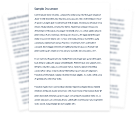Share Certificate
A Share Certificate is a document signed on behalf of the company as legal proof of ownership over the indicated number of shares.
4.5 (83 reviews)
Under 5 minutes
Suitable for Australia
Document Overview
A share certificate is a simple document that serves as official proof of a shareholder’s holding in a company. It is generally issued by the company secretary when the shareholder acquires the holding, whether it be through a share issue or transfer. The share certificate must be issued within two months of the acquisition.
Note that share certificates do not satisfy the requirement to give ASIC notice of the change in shareholding within 28 days of the acquisition. This notice must be given through their online portal.
A share certificate can be physical or digital. Digital certificates are more common these days, as they are easier to store.
Share certificates should also be given when a transfer results in an existing share certificate being outdated, so that every shareholder has their respective holding accurately reflected in their certificate.
This share certificate complies with the requirements of section 1070C of the Corporations Act for matters that must be specific in a share certificate.
Lawpath can assist with end-to-end share transfer requirements as part of its Company Changes service.
Use this Share Certificate if:
- There is a new shareholder purchasing shares in your business
- You need to specify the allocation of existing shares. This will involve the amount of shares allocated and the price that was paid for the shares. This is most important when outlining ownership of the business, where two or more business owners own the initial shares in the company.
What Does the Share Certificate Cover?
- The Certificate details the allocation of shares. This will include the number of shares, class of shares, and the amount paid for the allocated shares. The amount that is unpaid will also be outlined, although this may not be applicable in all cases
- The date on which the shares were allocated and the details of the shareholder
- The jurisdiction under which the Share Certificate has been made and in turn, the governing law.
Other Names for Share Certificate:
- Stock Certificate
- Certificate of stock.
View Sample Share Certificate
It's never been so easy
Sign-up to a free Lawpath account
Get started and we'll take care of you. It's that easy.
Browse our 500+ legal documents
Browse our 500+ legal documents to find the perfect match to cover your business needs. We've got Compliance, Employment, Service agreements and more.
Collaborate with e-Sign and Sharing
Having access to your legal documents has never been easier. You can request e-signature, share the document and download for an efficient collaboration.
Create unlimited legal documents and eSignatures for only $39/month.
Upgrade to a Lawpath legal plan to boost your new business.


Here's what people say about Lawpath's Share Certificate
Reviews are managed by BazaarVoice and comply with the BazaarVoice Authenticity Policy. Reviews are independently verified by BazaarVoice and detail our customers' real experiences.
0 reviews
Most Recent
Highest to Lowest Rating
Lowest to Highest Rating

